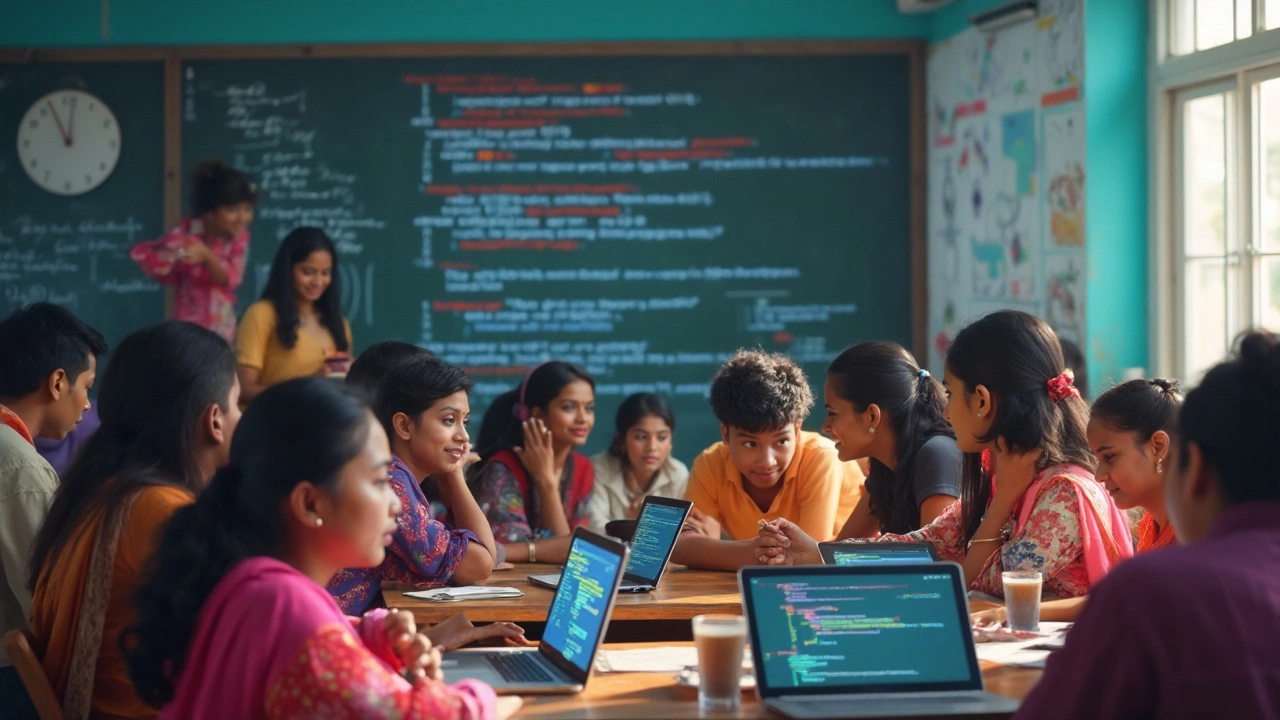In the digital age, where technology evolves at breakneck speed, many ambitious learners ponder the question: is dedicating merely one hour a day to learning coding truly enough? At first glance, an hour might seem minimal—a fleeting 60 minutes in a jam-packed schedule. Yet, this modest commitment holds potential for tremendous growth if approached with intention and strategy.
Through this article, we unravel the possibilities and challenges of this hourly pursuit. While one hour daily might not promise mastery overnight, it provides a robust foundation for building skills steadily. Join me as we navigate through effective learning practices, choosing right resources, maintaining enthusiasm, and setting realistic milestones. Whether you’re juggling a busy lifestyle or seeking a new passion project, this exploration may just provide the motivation you need.
- Understanding the Complex Landscape of Coding
- Setting Realistic Learning Goals
- Choosing the Right Resources
- The Power of Consistent Practice
- Tracking Your Progress
- Beyond the Hour: Maximizing Your Learning
Understanding the Complex Landscape of Coding
The world of coding is as vast as it is intricate, an ocean of languages, frameworks, and applications that shape the fabric of our everyday digital experiences. When you dive into the world of programming, you encounter a landscape teeming with variety and complexity. For the uninitiated, terms like JavaScript, Python, Ruby, and C++ might seem like alien dialects, but these languages embody the backbone of modern technology. They're not mere sequences of logic; they're creative tools that allow you to mold digital spaces to your imagination. From a simple app that tracks your habits to an extensive system managing bank transactions, coding can metamorphose an idea into reality.
Each programming language often serves a unique purpose, designed to solve specific problems or capitalize on the strengths of particular applications. For example, Python has gained popularity due to its simplicity and efficiency, often used in data science, web development, and automation tasks. On the other hand, if you dive into systems programming or game development, C++ might be your tool of choice, given its performance efficiency. While this diversity is empowering, it also demands an understanding of which language aligns with your goals.
The rapid pace of technological advancement adds another layer of complexity. Each year, new libraries, frameworks, and languages emerge, promising to streamline processes or introduce novel functionalities. Staying up-to-date can seem daunting, yet it speaks to the necessity of a strong foundation—allowing you to adapt and pivot swiftly through the dynamic digital terrain. As Bill Gates once said,
“Learning to write programs stretches your mind, helps you think better, and creates a way of thinking about things that I think is helpful in all domains.”This taps into the transformative power coding holds, not just in terms of technological prowess, but also in shaping cognitive abilities and problem-solving skills.
For those approaching the field with an hour-a-day strategy, understanding the coding landscape is akin to familiarizing oneself with a map before a journey. It's critical to balance learning the fundamentals, like algorithms and data structures, with practical applications to achieve tangible results. Engaging with open-source communities, participating in hackathons, or contributing to projects can be invaluable. It allows you to contextualize your knowledge and witness how theory translates into practice within collaborative environments. Embracing this complexity, rather than being daunted by it, transforms the learning journey into an adventure filled with continuous discovery.
Technology isn't static, which means your learning process shouldn't be either. Statistics from numerous learning platforms indicate that learners who actively engage with projects and coding communities retain knowledge more robustly compared to solitary study. Consider interacting with others through forums or platforms like GitHub or Stack Overflow. A study had shown learners collaborating on these platforms understood intricate coding concepts 40% faster. This collaboration also fosters the resilience needed to navigate failures, glitches, and bugs—each a stepping stone towards mastering coding. With the right mindset and tools, the complex coding landscape becomes not just navigable, but a realm of infinite possibilities.
Setting Realistic Learning Goals
Embarking on a journey to learn coding requires a roadmap forged with realistic and achievable goals. One common pitfall for new learners is setting the bar too high or failing to define clear objectives. Crafting goals is akin to drawing a treasure map; without a clear destination and stepping stones along the way, you might find yourself lost amidst a sea of information. The key is to break down the monumental task of mastering programming into digestible segments. This structured approach not only keeps frustration at bay but also provides the motivation derived from ticking off accomplishments, one by one. For instance, if your ultimate goal is to build a web application, start by focusing on the core elements, such as understanding HTML, CSS, and JavaScript dynamics. Each small victory should be a celebration, marking progress and fueling your desire to move forward.
Start by diving into what you want to achieve in the short term versus the long term. Short-term goals might include learning foundational programming concepts, while long-term aspirations could be building complex projects. It is vital to acknowledge that learning any new skill requires time and patience, and coding is no exception. A practical way to set your learning path is using the SMART criteria—Specific, Measurable, Achievable, Relevant, and Time-bound. For instance, instead of vaguely aiming to "learn Python," specify your goal: "complete a Python course and build a simple calculator app in three months." This approach not only provides clarity but reflects a commitment that fuels daily engagement.
An interesting fact to consider is the diversity of learning styles among individuals. Some learners absorb information visually, others through auditory means, or by practical, hands-on exercises. Studies have shown that understanding your unique learning style can dramatically enhance your effectiveness. Align your goals with learning strategies that complement your personal style. If you are a visual learner, incorporate video tutorials and infographics into your daily routine. On top of aligning goals with personal styles, embrace patience. A study by Anders Ericsson emphasized the significance of dedicated practice, illustrating that expertise requires regular engagement over time.
As Bruce Lee once said, "I fear not the man who has practiced 10,000 kicks once, but I fear the man who has practiced one kick 10,000 times." Consistent practice not only hones your skills but embeds an intuitive understanding of coding principles.
To better track your progress, consider maintaining a learning journal or leveraging digital tools geared towards education. Logging daily efforts and periodic reflections can illuminate patterns and alert you to areas needing improvement. Furthermore, software like Trello or Notion helps visualize your learning path through boards or timelines. As you progress, these documented reflections will serve as encouraging reminders of how far you've come. Creating a learning community, whether joining online forums or local coding meetups, can also spur accountability. Sharing your goals with others often spurs commitment and cultivates inspiration. Moreover, being part of a community allows you to benefit from collective wisdom, learning from peers' triumphs and challenges alike.

Choosing the Right Resources
When it comes to learning coding, selecting the right resources can significantly impact your journey. With so much information available today, sifting through various options might appear daunting at first. However, with a structured approach, you can harness the abundance of learning aids to suit your specific needs and preferences. From comprehensive online platforms to interactive tutorials, understanding what works best for you makes all the difference. Start by identifying your learning style; whether you're a visual learner or someone who thrives on hands-on practice, there’s a resource tailored just for you.
The internet offers a wealth of free and paid platforms, each offering distinct advantages. Websites like Codecademy, Coursera, and EdX provide structured courses, including certifications, to guide learners from the basics to advanced concepts. For those who prefer a more interactive approach, platforms like freeCodeCamp and Khan Academy offer coding exercises and projects that promote active engagement. It's crucial to explore a range of options to discover what sparks your interest; sometimes, a combination of resources might be the most effective approach.
For learners who like to read, an array of books provide in-depth knowledge and exercises. Titles such as “Automate the Boring Stuff with Python” by Al Sweigart or “JavaScript and JQuery: Interactive Front-End Web Development” by Jon Duckett offer not only educational content but also inspire creativity in coding. These books encapsulate the advantages of learning at your own pace and revisiting challenging concepts as needed. As technology evolves, so does educational content. New releases frequently bring fresh insights into existing topics, ensuring you remain aligned with current industry trends.
Another essential consideration is community support. The coding community is vibrant and inclusive, with forums like Stack Overflow, GitHub, and Reddit's programming sections providing invaluable peer assistance. Joining these communities connects learners with seasoned developers and coding enthusiasts who share a wealth of collective knowledge. Such interactions foster a sense of belonging and accountability, often motivating individuals to push through complex challenges. People frequently underestimate the encouragement and practical advice a supportive community brings to coding endeavors.
"Resources are an essential part of learning and development. The right toolkit can make the task at hand much more manageable and enjoyable," says Tim Berners-Lee, the inventor of the World Wide Web.
Finally, don't overlook the power of formal education through universities and technical colleges. Many institutions now offer part-time or evening courses tailored for those aiming to learn coding without disruptive life changes. These structured environments often couple quality instruction with practical exercises, providing a solid foundation. Whether you're exploring free resources or investing in formal education, having a clear objective sets the course for your learning journey. With the wealth of resources at your fingertips, embarking on the path to mastering coding is now more accessible than ever. Remember, the key isn't just having resources, but knowing how to use them wisely to fit your life and learning style.
The Power of Consistent Practice
Consistency in any skill development, including coding, holds the key to not just acquiring knowledge but to truly internalizing it. Picture learning to ride a bicycle; initially, you wobble and perhaps fall a few times, but persistent, daily attempts gradually bring balance and confidence. Similarly, practicing coding consistently helps to cement fundamental concepts in your memory, turning theoretical knowledge into practical skill. It's often said that coding is much like a language, and consistent repetition aids in fluency and versatility in this expressive form of problem-solving.
Research has shown that consistency fosters discipline and encourages continuous improvement. The "10,000-hour rule" popularized by Malcolm Gladwell highlights the importance of sustained practice over time. Though dedicating 10,000 hours might be unrealistic for hobbyist coders, the principle remains: the more regularly you engage, the deeper your learning becomes. Incorporating short daily sprints keeps new information fresh and allows the brain to make multiple connections between different coding concepts, leading to breakthroughs that might otherwise be elusive.
Moreover, the habit of regular practice can be quite empowering, serving as both a motivational boost and a buffer against procrastination. By making it a routine to spend just an hour immersing yourself in programming, you reduce the daunting nature of learning entire languages or frameworks at once. Breaking it down into digestible, daily tasks helps maintain momentum and can even enhance your enjoyment and curiosity about the process.
"We are what we repeatedly do. Excellence, then, is not an act, but a habit." — Aristotle
Consistent practice in coding has the added benefit of opening doors to complex concepts and challenging projects sooner than sporadic learning would. For instance, using daily coding classes or online platforms can streamline the learning process, drawing a clear path from basics to advanced topics. Industry statistics indicate that learners who adhere to regular practice significantly outperform those who learn erratically. A study by Codecademy found that participants engaged daily grasped new concepts 28% faster than those with irregular schedules.
| Consistency Level | Code Retention Rate |
|---|---|
| Daily | 85% |
| Weekly | 60% |
| Occasionally | 40% |
Building this practice into your lifestyle doesn't have to be restrictive. Consider setting specific goals or milestones to achieve each week or month. Use a planner or a mobile app that supports goal tracking, and reward yourself for small victories. These practices create a cycle of positive reinforcement, making you more likely to stick to the routine and enhancing your learning journey. Remember, while an hour a day might not seem substantial at the outset, over weeks, months, and even years, it becomes a powerful force for lasting competence and skill in coding.
Tracking Your Progress
Setting out on a journey to learn coding can be overwhelming. With intricate syntax and ever-evolving technologies, one might wonder how to stay motivated and see tangible progress over time. To maintain enthusiasm and verify that your daily hour truly adds value, tracking your progress becomes pivotal. The beauty of coding lies in its measurable improvements. Start by documenting every small victory—a successfully executed loop, a working function, or a fixed bug. Each achievement, no matter how minor, is a step forward.
Integrate tools like GitHub to systematically log your projects and code versions. This not only provides you with a visual timeline of progress but also strengthens your resume with a robust portfolio. Taking time each week to revisit these logs helps in recognizing patterns—what concepts do you grasp easily, and what requires a bit more attention? Consider supplementing your learning with coding quizzes and challenges from platforms such as HackerRank or Codewars. These platforms offer a unique way to apply what you've learned, presenting problems that can be solved in a rewarding competition-like environment.
One effective method to gauge advancement is by setting defined benchmarks. Rather than broad aspirations like "I want to become a programmer," break it down into achievable chapters. For instance, understanding JavaScript fundamentals within a month, followed by mastering DOM manipulation. After you've hit these milestones, re-cap them periodically. It not only reinforces knowledge but provides a clear measure of how far you've come. Implement a chart or spreadsheet to visualize these goals and monitor the time spent on each topic. This could help fine-tune your one-hour strategy, highlighting areas that might need more focus.
Many educators and programmers advocate maintaining a journal.
"Documenting your journey not only aids in retrospection but often clarifies concepts as you write," suggests renowned software engineer Robert C. Martin.When logging your learnings, aim to capture both the highs and lows. Days when code seems impenetrable and those when everything clicks perfectly are equally valuable. Looking back over weeks and months, you'll often find challenges that once felt monumental no longer pose a threat, illustrating clear growth in your programming capabilities.
With the right tools and mindset, you can turn the daunting task of learning a complex subject steadily into a series of rewarding achievements. Utilizing feedback loops, like peer code review, is invaluable in this journey. Constructive criticism not only highlights areas needing improvement but often unveils varied coding techniques you might not have considered otherwise. Engage with coding communities on platforms like Stack Overflow or Reddit's /r/learnprogramming. Sharing your code with peers can reveal unforeseen bugs and highlight innovative solutions, providing further evidence of your journey's progress.
Beyond the Hour: Maximizing Your Learning
When it comes to mastering coding, dedicating an hour a day is just the tip of the iceberg. To truly excel, the time outside this dedicated hour plays a crucial role. A big part of this involves creating a learning ecosystem that supports and enhances your abilities. One way to achieve this is by integrating what you learn into your daily routine. Simple tasks like automating mundane chores with scripts or engaging with coding forums can reinforce newly acquired skills. This continuous exposure not only solidifies understanding but also instills a problem-solving mindset essential for any coding enthusiast.
Diving deeper, networking with like-minded individuals can unlock opportunities and insights that you might not encounter on your own. Joining study groups, attending hackathons, or participating in online webinars can significantly broaden your perspective. It's important to remember that coding isn't just about writing code. It's about understanding the ecosystems behind different programming languages and how they can be applied in solving real-world problems. Interaction with peers often leads to discussions that provide new angles and solutions which might be overlooked when working independently.
Supplement With Additional Learning Resources
Despite the abundance of tutorials and courses available online, not all learning resources are created equal. A multi-faceted approach can fill gaps that are left behind by standardized curriculums. For instance, platforms like Codecademy or freeCodeCamp offer interactive exercises that give hands-on experience, while sites like Medium or dev.to host articles that keep you up to date with industry trends. Immersing yourself in a community-driven platform often results in a more engaging educational experience. To further expand knowledge, engaging in side projects or contributing to open-source can provide invaluable insights and practical experience.
"Real learning comes about when the competitive spirit has ceased." - Jiddu Krishnamurti
Accessing multiple resources exposes you to various teaching styles and techniques, often catering to different learning preferences. While one resource might offer comprehensive theories, another might excel in practical applications. Ideally, a mix of both can cater to the needs of various types of learners, making the journey enjoyable and thorough. Remember, the more diverse your resources, the better equipped you'll be to tackle the diversity of coding challenges you'll encounter.
Track and Reflect on Growth
As you embark on this journey, tracking progress becomes an essential component. It's not only motivating to see how far you've come but also instrumental in identifying areas that require more focus. Using journals, blogs, or vlogs to document your learning journey can be surprisingly rewarding. Reflecting on past challenges and the solutions you formulated enhances both retention and understanding. Furthermore, sharing these experiences publicly can inspire and help others who might be on a similar path. The process of reflection often leads to significant breakthroughs and self-discoveries that aren't apparent at first glance.
With technology playing a significant role in modern learning, tools like GitHub provide an excellent platform not just for code storage but also for showcasing your work to the world. Keeping a portfolio of projects, no matter how small, creates a visual timeline of growth. This track serves as a testament to your dedication and can be highly motivating when progress feels slow. As complex as coding may appear initially, perseverance combined with practical application outside that one hour a day accelerates the journey, making it not only quicker but also deeply satisfying.



